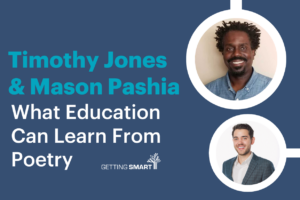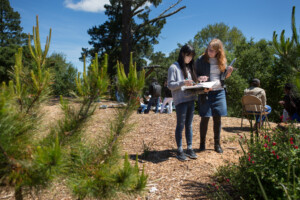Is Next Gen Learning a Political Act?

By: Andy Calkins
This post was originally published on NGLC.
All parents want whatever their children need in order to fulfill their highest potential. Next-gen learning is a means to this end, one everyone can get behind.
Is next-gen learning a political act? Here’s what I say: No. It’s not. It shouldn’t be. It can’t be.
But I can’t believe how much I struggled to feel clear about this.
What are the essential elements of next-gen learning, after all? Look at these three:
Developing agency and capability in others—students and educators alike—by giving up and distributing control, rather than harboring it in traditional, hierarchical ways that produce mindless compliance and rule-following
Facilitating active inquiry and open-mindedness in learning, rather than passive absorption of content with little room for questioning and exploring
Proactively embracing diversity as a fact of the modern world and an opportunity for learning, rather than a threat to learning that must be repelled
I list these three not because we have cooked them up in a conference room with a whiteboard. I list them because they (among other elements) genuinely reflect the profile of next-gen learning that is emerging from Next Generation Learning Challenges’ national community of educators and school designers. Educators across the country, in all kinds of communities and in all kinds of states, are leading the way on this.
These next-gen learning approaches are designed to enable students’ development of the capabilities and dispositions they need—and that our country and the world needs them to have—in order to face the complex challenges of the world they are inheriting. These competencies, which NGLC summarizes in our MyWays Project research, reflect a vision that all of us instinctively hold. It’s what Grant Lichtman points to in his book Moving the Rock as the one ideal that is universally held across all of our divisions—political, religious, racial: all parents want whatever their children need in order to fulfill their highest potential.

Academics. Employability. Wellness. Citizenship.
A Wisconsin school leader I met this year, Johnna Noll of Norris School District, organizes and communicates what her school is all about using those four terms. They are the dimensions of child and youth development that everyone understands and no one would argue against:
Sufficiently strong academic skills and core knowledge
21st-century competencies—collaborating, communicating, creating, learning—that employers want and that budding entrepreneurs (I would add) all need
Healthy social and emotional habits and the strength to address trauma and overcome all manner of societal ills including substance abuse and bullying
Understanding the hallmarks and workings of democracy in the United States and the responsibilities of belonging to a community
Right? These are goals for every child that everyone and every community can get behind. There’s no convincing necessary, because these are already the concerns of every parent—and everyone else who’s thinking about the future well-being of their community.
Next-gen learning—with its essential elements of developing agency, facilitating active inquiry, and proactively embracing diversity—is simply a means to those ends. A better name for next-gen learning would simply be: learning. Maybe effective learning. It is learning that is built on the science of human development, on what we all know to be powerful learning from our own personal experiences of it, and on what we know young adults need in order to thrive in a rapidly changing world. Instead of learning that is built around century-old ideas prioritizing efficiency, use of a single mode of learning (direct instruction), and age-based batch processing of children.
Our national politics are toxic right now. They are a black hole that consumes and perverts every issue, no matter how nuanced and complex, into tribal battle slogans. But at the local level, as Jim and Deb Fallows point out in their excellent 2018 book, Our Towns, good things are happening. Cities and towns from Holland, Michigan to Chester, Montana and from Guyon, Oklahoma to Burlington, Vermont are reimagining and reinventing themselves, using every available local resource—including their local public schools.
This vibrancy is happening in part because the progress taking hold in these places is non-political. The more vibrant the community, the Fallows write, the less likely it was for national politics to even come up in their conversations with the people of those communities.
This vibrancy is where the future of our public schools—and, let’s say it, the future of the nation—lies. What’s unfolding across the nation in the dynamism and personal and collective agency of ground-up community development is no different from the vibrant, exploratory, agency- and skill-building learning environment every child should experience in his or her public schools. There’s plenty of room for leadership, structure, problem-solving, honest debate, and for learning from mistakes in these kinds of communities and classrooms. There’s just no role—and no appetite—for political toxicity.
Learning, I now understand, is the antithesis of our troubled national politics. Ultimately, it will also have to serve as its antidote.
For more, see:
- Getting Smart Podcast | Andy Calkins on Effective Learning Competencies
- Next Gen Learning in Brooklyn
- Next Generation Learning Models for ELL Students
As Director for NGLC, Andy Calkins helps to lead strategy development, organizational management, and program execution across all phases of the initiative. Connect with him on Twitter at @andrewcalkins.
Stay in-the-know with all things edtech and innovations in learning by signing up to receive our weekly newsletter, Smart Update.




0 Comments
Leave a Comment
Your email address will not be published. All fields are required.